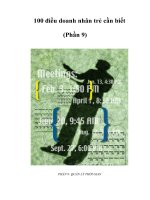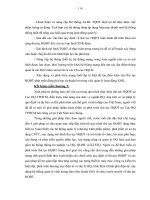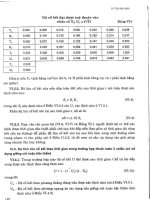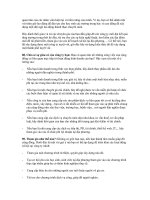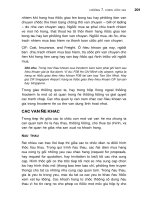LEADERSHIP STRATEGIES FOR PERSONAL SUCCESS phần 9 pdf
Bạn đang xem bản rút gọn của tài liệu. Xem và tải ngay bản đầy đủ của tài liệu tại đây (35.03 KB, 18 trang )
ETHICS
4. Approach our organization and operational duties with a
positive attitude and constructively support open
communication, creativity, dedication, and compassion.
5. Serve in such a way that we do not realize undue personal
gain from the performance of our official duties.
6. Avoid any interest or activity which is in conflict with the
conduct of our official duties.
7. Respect and protect the privileged information to which we
have access in the course of official duties.
8. Exercise whatever discretionary authority we have under law
to promote the public interest.
9. Accept as a personal duty the responsibility to keep up to
date on emerging issues and to administer the public's
business with professional competence, fairness,
impartiality, efficiency, and effectiveness.
10. Support, implement, and promote merit employment and
programs of affirmative action to assure equal opportunity
by our recruitment, selection, and advancement of qualified
persons from all elements of society.
11. Eliminate all forms of illegal discrimination, fraud, and
mismanagement of public funds, and support colleagues if
they are in difficulty because of responsible efforts to correct
such discrimination, fraud, mismanagement or abuse.
12. Respect, support, study, and, when necessary, work to
improve federal and state constitutions and other laws which
define the relationships among public agencies, employees,
clients, and all citizens.
SM ET-7
ETHICS
SM ET-8
ETHICS
ACTIVITY 2
DIFFERING EXPECTATIONS AND ETHICAL CONFLICTS
The following scenarios describe situations in which formal (organizational)
expectations conflict with informal expectations of the public, a supervisor,
subordinates, or oneself. Differing expectations often create ethical conflicts
which need to be resolved.
Instructions:
Step #1 In your small group, discuss your assigned scenario, the formal
expectations, and the informal expectations.
Step #2 Determine the ethical considerations if informal expectations are
allowed to continue.
Step #3 Determine how a CO should handle the situation.
Step #4 List your results and select a spokesperson to report on your
ethical considerations and the resolution of the situation.
You have 10 minutes to complete the exercise.
SM ET-9
ETHICS
SM ET-10
ETHICS
ACTIVITY 2
WORKSHEET
Group #1 Community Expectations
Scenario: Your fire station, located next door to the public tennis courts, has
always had citizens come into the station to use the restrooms,
water fountain, and cold drink machine. During the summer, cold
drink sales made enough money to buy a television set for the rec
room. Since the city recently installed lighting for the courts,
citizens frequently come in during the evenings. Several attractive
young ladies have been spending a few hours after playing tennis
watching television and joking around with the male members of
the company.
Informal Expectations of Involved Citizens and Subordinates
The fire station is public property and therefore open to the public. They are not
interfering with official activities and are causing no harm.
Formal Expectations (Official Department Policy)
Visitors to the fire station should be approved by the station officer and the
duration of visits should be limited to the time it takes to conduct whatever
business is needed.
ETHICAL CONSIDERATIONS HOW SHOULD THE CO HANDLE?
1.
2.
3.
SM ET-11
ETHICS
ACTIVITY 2
WORKSHEET
Group #2 Supervisor's Expectations
Scenario: The battalion chief, when visiting your fire station, usually spends a
half hour or more talking about the fire chief in a very negative
manner. The battalion chief finds fault with every order or policy
that comes from the chief's office. The members of your company
think the battalion chief is great because he really understands
how they think and feel.
Informal Expectations of Your Supervisor
The battalion chief has a duty to keep all members of his/her battalion informed
about the orders and policies of the department and he/she also has the right to
add personal opinions to policy matters.
Formal Expectations (Department Policy)
All members of the department should demonstrate loyalty to the department,
their superiors, their subordinates, and to each other.
ETHICAL CONSIDERATIONS HOW SHOULD THE CO HANDLE?
1.
2.
3.
SM ET-12
ETHICS
ACTIVITY 2
WORKSHEET
Group #3 Subordinate's Expectations
Scenario: For many years, several times a week, your company has stopped
by a local ice cream parlor for ice cream cones. The owner doesn't
discount the price, but does give double scoops at no extra charge
to the firefighters.
Informal Expectations of Subordinates
This stop for ice cream has become somewhat of a tradition of this company. No
one sees any problem if the store owner wants to give a little extra to the
firefighters who stop by.
Formal Expectations (Department Policy)
No member of the department shall accept any tips, gratuities, presents, money,
etc. as representatives of the department.
ETHICAL CONSIDERATIONS HOW SHOULD THE CO HANDLE?
1.
2.
3.
SM ET-13
ETHICS
ACTIVITY 2
WORKSHEET
Group #4 Self Expectations
Scenario: Your nephew, Al, recently graduated from recruit school and has
been assigned to a company officer at a different station from
yours. The officer does not know Al is your nephew. Today at a
critique you both attended, this lieutenant mentioned that he
suspects Al of pilfering some station supplies and is going to try to
catch him in the act over the next several days. This would result
in Al's termination.
Your Informal Expectations
This young man is my nephew and I owe it to him and his family to warn him.
Formal Expectations (Department Policy)
Any member caught stealing will be immediately suspended without pay and
criminal charges sought by the department.
ETHICAL CONSIDERATIONS HOW SHOULD THE CO HANDLE?
1.
2.
3.
SM ET-14
ETHICS
ACTIVITY 3
ETHICAL DECISION-MAKING
Purpose:
To examine the day-to-day ethics of a group to determine:
a. Consistency.
b. Agreement.
c. Differences.
To discover the actual principles or culture and values which influence certain
decisions in the group.
To discover if there is an impact on decisions by missions, goals, policies,
procedures, training, performance standards, etc.
To provide an actual opportunity to wrestle with some tough day-to-day
decisions, calling into play both personal and organizational ethics.
Instructions:
Step #1: In your small group select one person to act as coordinator/
timekeeper.
Step #2: Each person, including the coordinator, lists all others in the group
(except himself/herself) on the worksheet.
Step #3: Coordinator/Timekeeper mixes up the photocopies. The person
who volunteers to begin draws a photocopied sheet.
Step #4: The first volunteer reads his/her scenario (privately), and has 2
minutes to decide a course of action. If the options are not
acceptable, a new one can be created. Each person should decide
what is ethical (proper and right) for the situation "in the real
world."
Step #5: He/She then reads his/her scenario aloud, gives his/her decision,
and explains why that option was chosen. (1 minute.)
Step #6: Without discussion, others in the group score on the worksheet
how much they agree with the choice and the reasons for it. (1
minute.)
SM ET-15
ETHICS
Step #7: Group members then tell the decisionmaker what scores they gave
and why.
Step #8: The group then has 5 minutes to question the decisionmaker, and
ask for justification of the choice. (Why that option? Why not
others?) Do not try to solve the original problem or avoid it.
Discuss the ethics of the decision made.
The coordinator moves on to the next decisionmaker, who draws a scenario.
The process is repeated until all (including the coordinator) have made an
ethical decision and justified it to the group.
ETHICAL DECISION-MAKING WORKSHEET
Scoring
2 3 4 5 6 7 8 9 10
< < < < > > > >
Shades of Disagreement Shades of Agreement
I totally disagree with I accept your I totally agree with you on
you on this choice choice, but your choice and your
and your reasons. disagree with reasons.
why you chose
that option.
Group Members
Score I
Gave to
Decision Scores Others Gave
1.
2.
3.
4.
When you have completed one round, discuss the following questions:
SM ET-16
1
ETHICS
1. What makes ethical decisions difficult?
2. How much difference or similarity was there in the scores, and why?
3. What did your group learn from this exercise?
SM ET-17
ETHICS
II. GUIDELINES AND RESOURCES
A. Many people have a stake in decisions.
B. Different people may have legitimate but contradictory
expectations.
C. The CO's own ethics count too.
D. Ethical decisions need to consider community/organizational/
personal standards.
E. The clearer the standards, the easier the decision.
F. Evaluating available resources/guidelines can help you resolve
ethical dilemmas.
SM ET-18
ETHICS
SM ET-19
ETHICS
ACTIVITY 3
GUIDELINES AND RESOURCES TO ASSIST IN DECISION-MAKING
SCENARIO
Lieutenant Margaret Black has been the Company Officer at Station 23 for two
months. Annual performance evaluations are due next week and the lieutenant
isn't sure how to handle one of her subordinates.
Old Smoky is an engineer with 28 years on the department. He openly admits
that he's just counting days until he retires in two years. The lieutenant has
noticed that the rest of the crew always "covers" for Smoky. Their attitude
seems to be: "He's put in his time; he deserves a little slack."
At first Lieutenant Black thought Smoky just had an attitude problem. He resists
and openly criticizes department efforts in EMS and Code Enforcement. He
brags that he wasn't hired to be a "nurse" or a "cop."
But, unfortunately, Smoky's shortcomings are more serious than just an attitude
problem. He hasn't even kept his firefighting or engineering skills current. Last
week he caused some minor damage to one of the pumps and Lieutenant Black
had to formally counsel him.
The lieutenant has reviewed Smoky's previous evaluations and officially he has
met required standards. Unofficially, prior supervisors have admitted there were
lots of times when Smoky fell short of minimum standards.
Today, two other crew members have informed Lieutenant Black that Smoky
committed two potentially dangerous errors on the previous shift. He mistakenly
cut off the water supply during a working fire and he performed CPR incorrectly.
The crew members have received the lieutenant's promise that she would not
involve them in whatever action she decides is necessary. They have also
admitted that they did not tell the whole truth when they completed their reports
on the incidents in question.
SM ET-20
ETHICS
SM ET-21
ETHICS
SM ET-22
ETHICS
SM ET-23
ETHICS
SM ET-24

